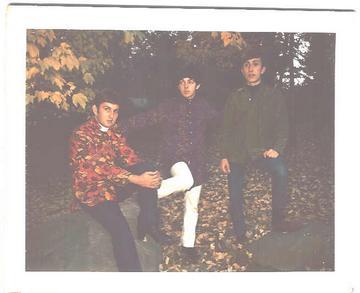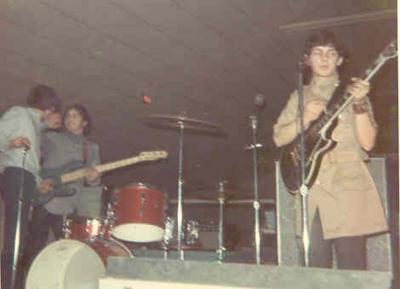Glass Harp
Youngstown (Austintown), 1968-73


The seeds of Glass Harp were planted in 1964 between St. Christians grade school students Phil Keaggy and John Sferra. Phil had brought his guitar to show and tell and a girl suggested John to play drums with him. From then a musical partership developed that would finally place them in a band together 4 years later....but before that could happen, John formed a band with school mates Nick Roman and John Markovich. Meanwhile, Phil had joined the Squires as a prodigious lead guitarist. For a brief time John filled in on drums for the Squires.
In '66 Phil and his family moved back to California (where they lived before moving to Austintown). John and Phil kept a mail correspondance with Phil filling John on all the latest SoCal hip bands, and his meeting with Dick Dale that helped Phil get a Fender Strat. Phil was most taken by Mike Bloomfield and the Electric Flag and decided to form his own band in the same style. Meanwhile, John had joined the Jokers, a Motown styled band of mostly older musicians that played 16 weeks at a club called the Tropics. Phil returned to Austintown and started to recruit players, but he was not able to get the keyboard and horn players. He did hook up with bass player Steve Markulin. Another Austintown band, the Volumn IV, needed a guitarist and Phil joined them for six months or so. Still unable to find the Electric Flag collection of players, the three piece combo of Phil, John, and Steve started playing teen dances in Youngstown and quickly grew a big buzz around town. Geoff Jones, a Boardman resident, became their manager and arranged for the band to record an LP at United Audio in early '69. 8 songs were recorded and pressed up on 12" acetates, about 15 or copies were made, and two songs, "Where Did My World Come From" b/w "She Told Me" were pressed on a United Audio 45. The LP included the originals "High Flight", "Groovin' With Sammy", "Save Me", and "We've Just Begun", and the Beatles covers "Eleanor Rigby" and "What You're Doing". The Beatles were a major influence on the band, especially Phil, who also had a resemblance to Paul McCartney. Geoff Flowers sent a copy of the acetate to Apple records in hopes of getting on their heroes' label but were politely but firmly rejected. During this time the band also recorded a song for the Arbys Roast Beef fast food chain, whose origins were in the Youngstown area. The song was an instrumental called "Rare" released on a 7" giveaway promotional record. The song starts with Steve Markulin yelling "Swing Over!".
Shortly after the LP recording, Steve quit the band to join his cousin Joe Markulin in the Human Beinz. After a short-lived replacement, Dan Pecchio of the popular heavy psych band the Poppy was asked to join the band. The Poppy were on hiatus due to a serious accident with their van that injured guitarist Roger Lewis. The band really started to take off with prominent gigs in Cleveland and Kent. Their sound began to evolve away from tight Beatles styled songs to longer, improvisational pieces with modal influences. While playing at the Idora Park ballroom, the group was seen by Chip Kelinger, a Warner Brothers promo agent from Akron, who signed them to a six month binding contract. During that time, (summer of 70), the group won a huge battle of the bands at Meyers Lake, taking home a whopping $1200 prize. Witnessing the battle was producer Marty Thau, who dispatched producer Lewis Merenstein to further scout the Glass Harp. The group was signed to Decca and they recorded their first official LP at Jimi Hendrix's Electric Ladyland studios in September 1970. If you know history, you might recall Jimi's death at the time, which occured while the band was recording. The entire recording was completed in 7 days with minimal overdubs....so the band was surprised when the completed recording featured overdubbed strings! After recovering from the shock, the band seemed to warm up to the "Let It Be" styled effects. The LP did well in the band's main area of Ohio, Western PA, and West Virginia. While on a tour in Maryland, Phil got the word that his mother was in a terrible car accident. The injuries were so serious that she passed away shortly afterward. This incident was the final catalyst that lead Phil to becoming a born-again Christian, or in parlance of the times, a "Jesus Freak".
With the first LP getting strong reviews and some FM radio airplay, the band started a long stretch of touring while contiuning to play shows in the NE Ohio area. In 1971 the band recorded their 2nd LP "Synergy". For this LP they had moved up in the Decca hierarchy, getting a gatefold cover, and having the LP released without post process instrumentation. The LP didn't really expand their popularity but they continued to win fans over with their live shows which featured three excellent musicians who together were much greater than the sum of their strong talents. Included in their 1971 live shows was a performance at Carnegie Hall on November 21, which was recorded for a possible live LP release. The show was released, but not until the 1990s. The band played shows from coast to coast. Early in 1972 a peformance aired on the local public TV station WVIZ (at the time part of NET, pre PBS). Remember, this was when rock music was still not considered real culture by the older mainstream, so it was a big deal.
In the spring of 1972 they recorded a third LP (released in the summer of 1972) called "It Makes Me Glad". This LP included more short songs and less extended solos. The group set out touring to support the LP but tension between Phil's Christianity and rock-n-roll life proved too much. Phil left the band in August of 1972 and after some soul searching, they found a new guitarist in Tim Burks, a Warren resident who was in the Blues, Inc. It's not fair to call him a replacement for Phil as he was unique - but the band continued, adding a fourth member, Randy Benson (formerly of Tiny Alice) on violin. There was an attempt to record more songs but Decca was no longer supporting the band so nothing came of it. In the summer/fall of 1973 the band was playing shows in the NE Ohio area but more sporadically. The band was still popular and well regarded, but the three member band with Phil had been the. Sometime in late 1973 the band played their last show and in January 1974 the group announced their dissolution. The Glass Harp has staged a couple reunions in the late 1990s that were instant sellouts, and reformed for good, as a performing and recording act.
After Glass Harp, Dan Pecchio joined the Michael Stanley Band on bass for 12+ years. Right after GH disbanded, John Sferra and Tim Burks formed Hartship, a band that was a more progressive rock extension of the GH sound. That band lasted for nearly a year. John played in a couple popular regional bands, notably the Great Lakes Band, who released a couple 45s. After becoming a Christian, Phil Keaggy started performing solo at the Barn, a Christian coffeehouse in Newton Falls, prior to a long lasting career in the Christian Music scene. He cut one LP c. 1990 that was more secular oriented and had a strong Beatles influence. The Glass Harp continues to have devoted fans, some directly for them, and others who came to the band through Phil's Christian music.